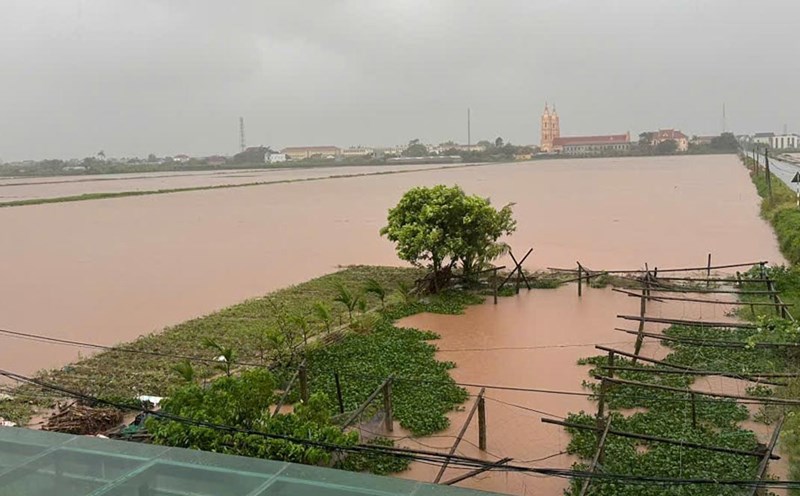Ensuring supply, stabilizing prices
Faced with the strong impact of storm No. 3 Wipha, many supermarkets have urgently deployed preventive measures to ensure adequate supply of goods to people during the storm.
Speaking with Lao Dong, Mr. Nguyen Van Manh - Director of WinMart Thang Long supermarket (Hanoi) said - right from the time there was information about storm No. 3, WinMart quickly deployed a backup plan, closely coordinated with the Departments of Industry and Trade of provinces and cities to ensure adequate reserves of essential goods, food, dry food, etc.
For vegetables and fruits, WinMart has proactively planned to coordinate the supply of vegetables from Lam Dong to the North to promptly meet the strong demand in areas affected by the storm. All products are strictly controlled from reception, storage to display. The amount of reserves, vegetable and meat orders increased by more than 50% compared to normal days.
For stores located in the storm center or in flooded areas, WinMart activates flexible operating scenarios, proactively coordinating with suppliers to coordinate goods sources. In any situation, we try to transport and ensure that the goods do not break, ready to distribute to supermarkets/stores - Mr. Manh informed.
According to Mr. Manh, as soon as information about storm No. 3 was recorded at many points of sale of WinMart/WinMart+, purchasing power increased dramatically, with some supermarkets up to 200% compared to normal. The supermarket has planned a supply plan to ensure a stable supply of goods and prices.
Currently, WinMart/WinMart+/WiN in areas affected by storm Wipha are also facing many difficulties, but we are making efforts to ensure the safety of workers in supermarkets and stores, maintain business operations, stabilize prices for consumers, and contribute to ensuring social security - Mr. Manh informed.
According to Lao Dong, other supermarkets such as Saigon Coop in the Northern region, AEON MALL... also said that they have increased the supply of goods in the supermarket system to serve people against the storm and committed to stabilizing prices at all stores.
Proactively control the market
Implementing Official Dispatch No. 5380/CD-BCT of the Ministry of Industry and Trade on emergency response to storm No. 3 (WIPHA), the Department of Domestic Market Management and Development (Department of Information and Communications) has issued a document requesting the Departments of Industry and Trade of provinces and cities in affected areas such as Quang Ninh, Hai Phong, Hung Yen, Lang Son, Cao Bang, Thai Nguyen, Lao Cai, Tuyen Quang, Phu Tho, Dien Bien, Lai Chau, Son La... to urgently deploy solutions to ensure market stability and meet the essential needs of people in all situations.
First of all, regarding market inspection and control, the Domestic Market Management and Development Department requires localities to direct Market Management forces to regularly closely follow market developments and situations at the grassroots level. At the same time, it is necessary to strengthen supervision, inspection and control activities to promptly detect and strictly handle violations of the law in the field of trade, especially for essential goods serving production, business and people's lives before, during and after the rainy and stormy season.
In particular, in the event of natural disasters, localities need to proactively handle acts of taking advantage of the situation to speculate, hoard goods, or increase prices unreasonably, especially for food, foodstuffs and construction materials.
At the same time, the supply of goods also needs to be focused on. The Departments of Industry and Trade are requested to urgently develop and implement a plan to reserve essential goods in accordance with the actual conditions of each locality.
This plan must clearly define the list, quantity, storage method, transportation and distribution of goods such as food, foodstuffs, clean water, construction materials and petroleum, to ensure timely supply in case of natural disasters causing district isolation.
Not only that, coordination with businesses to register to reserve goods together with commune and ward authorities to operate the distribution network also needs to be strengthened. In addition, localities need to regularly update and report on supply and demand, prices and distribution systems, thereby ensuring smooth and accurate market management information.











